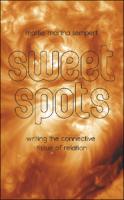Sweet Spots
Writing the Connective Tissue of Relation
Author(s)
Sempert, Mattie-Martha
Collection
ScholarLedLanguage
EnglishAbstract
Sweet Spots thinks transversally across language and body, and between text and tissue. This assemblage of essays collectively proposes that words—that is, language that lands as written text—are more-than-human material. And, these materials, composed of forces and flows and tendencies, are capable of generating text-flesh that grows into a thinking in the making. The practice of acupuncture—and its relational thinking—often makes its presence felt to twirl the text-tissue of the bodying essays. Ficto-critical thinking is threaded throughout to activate concepts from process philosophy and use the work of other thinkers (William James, Félix Guattari and Gilles Deleuze, Baruch Spinoza, and Virginia Woolf, to name a few) to forge imaginative connections.
Entangled in the text-tissue are an assortment of entities, such as bickering body parts, quivering jellyfish, heart pacemaker cells, a narwhal tooth, Taoist parables, always with ubiquitous, stretchy connective tissue — from gooey interstitial fluid to thick planes of fascia — ever present to ensure that the essaying bodies become, what Alfred North Whitehead calls the one-which-includes-the-many-includes-the-one.
The essaying bodies orient towards the sweetest sweet spot which is found, not in the center, but slightly askew, felt in the reverbing more-than that carries their potential. Crucially, this produces a shift in perspective away from self-enclosed bodies and experts toward a care for the connective tissue of relation.
Keywords
acupuncture;Alfred North Whitehead;Baruch Spinoza;Chinese traditional medicine;Gilles Deleuze and Félix Guattari;more-than-human;process philosophy;relational thought;taoismDOI
10.53288/0340.1.00ISBN
9781685710101, 9781685710118Publisher
punctum booksPublisher website
https://punctumbooks.com/Publication date and place
2021Imprint
Ecologies BookClassification
Western philosophy from c 1800
Taoism
Traditional medicine and herbal remedies


 Download
Download Web Shop
Web Shop